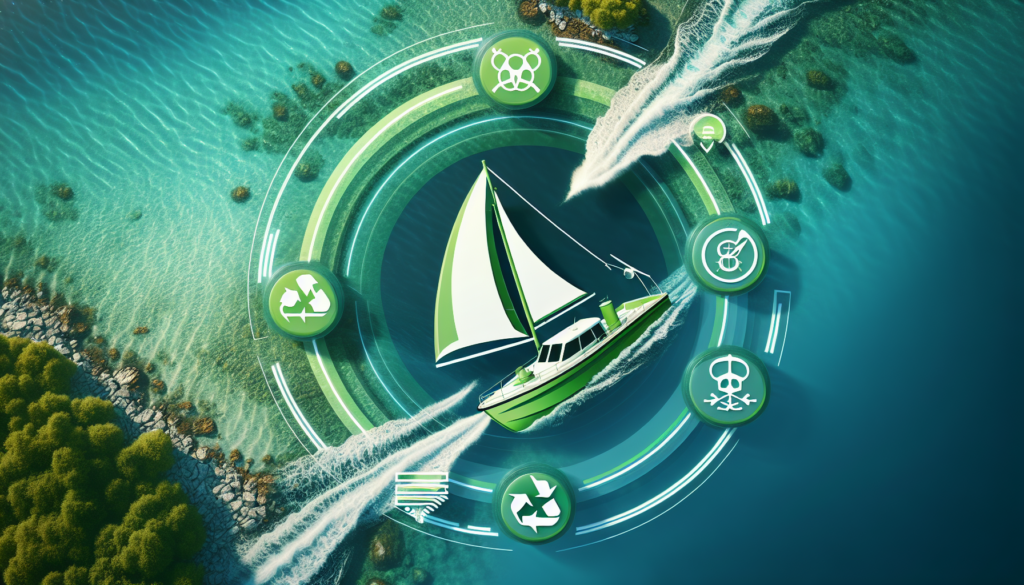Imagine gliding across the water on a sunny day, the wind in your hair and the sound of nature all around you. Now, imagine that experience being marred by oil spills, noise pollution, and the sight of trash drifting by. To prevent this scenario, eco-friendly boating regulations have been put in place. Yet, as a boat owner, are you aware of these regulations and their importance? Compliance isn’t just about avoiding penalties—it’s about loving the waters you sail and preserving them for future generations. In this article, you’ll gain insight into these vital regulations, learn about how they’re enforced, and become equipped with knowledge to ensure your boating practices do not harm the environment.

Understanding Eco-Friendly Boating
Hey there, let’s dive into the world of eco-friendly boating, shall we? Eco-friendly boating, also known as green boating, is all about practicing and promoting boating activities that cause minimal harm to the marine environment. The principles behind it include reducing pollution, using renewable resources, and ensuring minimal disturbance to marine life.
Concept and principles of eco-friendly boating
Green boating focuses on three main principles: Reduce, Reuse, and Recycle. Reduce refers to minimizing your consumption, especially in terms of fuel, water, and electricity. Reuse involves extending the lifecycle of products while Recycle emphasizes disposing waste correctly, where it can potentially be made into something new. The idea is to leave as little footprint as possible on the marine environment.
Advantages of eco-friendly boating
In adopting eco-friendly boating practices, you’re not just helping to preserve marine life, but there are some financial benefits too. For instance, using renewable energy like solar or wind power can help lower costs in the long run. Also, regular maintenance of the boat can increase its lifespan and performance, meaning fewer expenses for repairs or replacements.
Growing global trends towards eco-boating
Globally, there’s an increasing shift towards eco-boating. More and more boaters and industry stakeholders are realizing the importance of sustainable practices this is being reflected in the rising popularity of electric boats, biofuels, and the advancements in cleaner and more efficient engine technologies.
International Boating Regulations
Getting to know international boating regulations is pretty essential, as violations can lead to serious consequences.
Key organisations and their roles
Many authorities play significant roles in implementing these regulations. For example, the International Maritime Organisation (IMO) sets standards for safety and environmental performance in global shipping while local Coastal Authorities develop and enforce guidelines to safeguard the particular coastal zones they govern.
Review of main international regulations
Among the major regulations are those related to pollution prevention, like the MARPOL Convention, which restricts different types of marine pollution. Then, there is the Ballast Water Management Convention which aims to control the spread of harmful aquatic organisms from one region to another.
Compliance on an international level
Compliance to these regulations benefits everyone as it ensures marine safety and protects the environment. It’s usually checked during surveys carried out by member states of the IMO, and vessels that fail to comply risk penalties and may be detained.

Impact of Regulations on Eco-Friendly Boating
The regulations not only impact traditional boating but also directly encourage eco-friendly practices.
Effects of regulations on traditional boating
Regulations may cause initial hiccups for traditional boaters. They may have to update their old equipment or adapt new technologies to abide by the rules. However, these changes ultimately lead to more efficient practices, cost savings, and cleaner waters.
Encouraging eco-friendly practices through regulations
Eco-regulations play a crucial role in promoting sustainable boating as they set a minimum standard for environmental responsibility. They motivate boaters to reduce waste, minimize pollution, and use renewable energy.
Association between regulations and sustainable boating
Regulations and sustainable boating go hand in hand. The rules set by authorities guide boaters towards more eco-friendly practices. As a result, compliance to regulations invariably means adopting sustainable boating practices.
Specific Environmental Regulations impacting Boating
Environmental regulations specific to boating majorly cover water, noise, air pollution, and the protection of marine life.
Water pollution control rules
These rules are aimed at preventing dumping of litter, sewage or any other harmful materials into the water. Certain regulations also dictate where and how boats can discharge waste.
Rules limiting noise and air pollution
There are strict rules around controlling noise and air pollution generated from boats. This includes rules on engine emissions and specifications for sound-proofing components.
Regulations for protection of marine life and habitats
Some guidelines relate to navigating near sensitive habitats, reducing speed in certain areas to avoid hitting marine animals, and using fishing gear that minimises harm to unrelated species.

Compliance with Eco-Friendly Boating Regulations
Becoming eco-friendly isn’t just about knowing the rules, it’s about putting them into practice.
Responsibilities of boat owners
As a boat owner, it’s your responsibility to understand these rules and ensure your boat complies. This includes having the necessary equipment installed and ensuring waste is disposed of properly.
Roles and duties of boat operators
Boat operators should be trained and aware of eco-friendly practices. They should follow the guidelines at all times, report any issues, and update maintenance logs regularly.
Tools and strategies for ensuring compliance
A compiled checklist can be an effective tool, along with regular audits and inspections. Also, using technology like sensors can help in monitoring compliance with emission regulations.
Technology to Assist Compliance with Eco-Friendly Regulations
Technology plays a big part in eco-friendly boating by making compliance easier and more efficient.
Technology for efficient fuel consumption
Technologies like energy-efficient engines, hybrid propulsion systems, and renewable energy sources help reduce fuel consumption and carbon emissions.
Eco-friendly materials in boat construction
Incorporating sustainable materials for boat construction, such as bio-based resins and recycled metals or plastics, helps minimize environmental impact.
Monitoring tools for compliance verification
Tech tools can help track and verify compliance with regulations. Devices like emission sensors, satellite tracking, and eco-navigation software can be very helpful.

Enforcement of Eco-Friendly Boating Regulation
Without enforcement, regulations are just words. Thankfully, there are robust mechanisms in place to enforce the rules and penalise non-compliant boaters.
Mechanisms in enforcing regulations
Enforcement usually starts with random checks and inspections by relevant authorities. Advanced technologies like drones, satellite surveillance, and AIS tracking also play a big part.
Consequences of non-compliance
Non-compliance can have serious consequences such as hefty fines, ban from certain waters, and even criminal charges.
Case studies of successful enforcement
There have been successful enforcement cases across the globe, where authorities have detected violations and held the offenders accountable, contributing to cleaner and safer waters.
Role of Education in Promoting Eco-Friendly Boating
Education plays a vital role in understanding why it’s crucial to preserve the marine environment and how regulations contribute to this.
Educational programs and resources
There are various programs that offer education and training on eco-friendly boating. They cover various topics such as waste management, navigation rules, wildlife protection, and best green boating practices.
Importance of awareness in ensuring compliance
Awareness is key to ensure compliance as it makes people understand the why behind the regulations. When boaters understand how their actions impact the environment, they’re more likely to follow the rules.
Initiatives for eco-boating literacy
Many initiatives are aimed at enhancing eco-boating literacy. These include public awareness campaigns, school programs, and online resources to assist boaters.
Challenges in Compliance and Enforcement of Regulations
Despite the efforts, challenges abound when it comes to compliance and enforcement.
Barriers to compliance
Some boaters may resist due to the cost of compliance or lack of understanding about regulations. Equipment unavailability or technical barriers in adopting certain measures can also pose issues.
Difficulty of enforcing regulations on international waters
Enforcing regulations on international waters can be challenging due to jurisdictional conflicts, lack of resources, and the vastness of the ocean itself.
Strategies to overcome challenges
Strategies to overcome these include promoting awareness, offering technical and financial support, and enhancing international cooperation for effective enforcement on global waters.
The Future of Eco-Friendly Boating Regulations
As we look ahead, the future of boating lies in sustainable practices.
Potential changes and improvements in regulations
As we gain more knowledge and technology develops, we can expect more stringent regulations. For instance, emission standards may become tougher, and more emphasis could be placed on renewable energy.
Impact of technological advancements on regulations
Upcoming technology like AI and machine learning could revolutionize compliance and enforcement of regulations, making it more efficient and accurate.
The outlook for compliance and enforcement
With awareness being raised and technological advancements, compliance and enforcement could improve significantly, helping us achieve the ultimate goal – a clean and safe marine environment for all. So let’s all set sail into a greener, more sustainable future!

